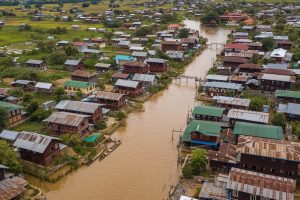The United Nations World Food Programme (WFP) reports that up to 7 million people in Northern Ethiopia are facing a hunger crisis and are severely short of food. This number includes over 5.2 million people in Tigray who are relying on U.N. food aid to survive. This situation has been aggravated by the conflict which has engulfed the whole region, thrusting 1.7 million more people into hunger and 300,000 from their homes. This month, WFP kick-started its delivery of emergency relief food to communities in Northern Ethiopia, on the border of the war-torn region of Tigray. Working with Ethiopia’s Federal and Regional Government authorities, the agency plans to reach 250,000 people in Amhara and 530,000 in Afar with food aid, but will expand efforts with the increase in needs and if funding is received.
The agency has further declared an unprecedented funding gap of $US426 million across its operation in Ethiopia and appealed for funds to fulfil the needs of up to 12 million people this year. As the situation in Tigray worsens, the World Food Programme and its partners continue with the struggle to scale up and meet the urgent food needs of the people depending on food aid for survival. Relief Food stocks held by WFP and its partners were almost near depletion until Monday when the first convoy in more than two weeks got into the region. The convoy of more than 100 trucks led by WFP carried 3,500,000 kilograms of food and other life-saving cargo, including health and shelter items and fuel.
Michael Dunford, WFP’s Regional Director for Eastern Africa, stated that the agency calls for the collaboration of Afar’s federal and local authorities to ensure its convoy finally made it safely into Tigray. He further urged that much more is needed and this momentum must be maintained to ensure delivery of enough food to save millions from falling deeper into hunger. World Food Programme ground teams can now start on the delivery of the next series of food distributions in Tigray. The teams will reach up to 3 million people in Tigray, thereby increasing the number by 900,000 since the agency took charge of operations in two north-western Zone districts namely Tahtay Koraro and Shire Town, from its non-governmental food partners. The Eastern Africa Regional Director of WFP also warned that with time running out for millions of people across Northern Ethiopia, immediate additional funding is crucial, otherwise, they will be pushed to cut rations or worse, stop distributions to some 4 million people they are trying to reach in Amhara, Afar, and Tigray in the coming months.
Apart from the growing conflict in the northern region of the country, millions of people across the whole of Ethiopia have no food security. This is due to the unusual funding gap for the operations of WFP in the country. Over 13.6 million people across Ethiopia are estimated to face food insecurity due to the ongoing combined impacts of drought, desert locust invasions, floods, high food prices and market disruptions, and the COVID-19 pandemic, all of which have been heightened by the current conflict spreading across the northern regions of the country. WFP is appealing for additional funds to expand its response in emergency food assistance over the next six months and offer long-term solutions to food insecurity for people as they enter the annual ‘hunger season’.







